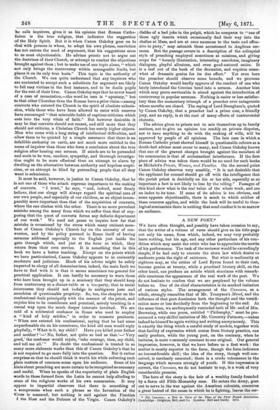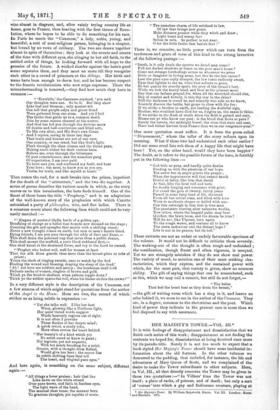A NEW POET.* WE have often thought, and possibly have
taken occasion to say, that the writer of a volume of verse should give on his title-page not only his name, from which, indeed, we may very probably learn nothing, but his age, and any other particulars of his con- dition which may assist the critic who has to appreciate the merits of his performance. The task of the reviewer would be exceedingly simple, if he had only to execute the stern law which denies to mediocre poets the right of existence. But what is mediocrity at eighteen may, as the critics of Lord Byron found to their cost, become genius at twenty, while a practised literary skill, on the other baud, can produce an article which simulates with remark- able exactness the appearance of the real work of the poet. We do not hesitate to confess that we are perplexed by the volume before us. One of its chief characteristics is its marked imitation of various styles. The arrangement of the Canoness, as a whole, strongly resembles that of Mr. Tennyson's Maud, and the influence of that poet dominates both the thought and the versifi- cation more or less decidedly from the beginning to the end. At the same time, we are frequently reminded both of Mr. and of Mrs. Browning, while one poem, entitled "Philosophy," must be pro- nounced a very skilful imitation of Mr. Coventry Patmore,—unless indeed he himself be again writing and writing anonymously. This is exactly the thing which a careful study of models, together with that facility of expression which comes from literary practice, can easily produce, while the young poet, on the contrary, when he imitates, is more cmimonly constant to one original. Our general impression, however, is that we have before us a first work : the matter is mostly superior to the form, though the form indicates no inconsiderable skill ; the idea of the story, though well con- ceived, is carelessly executed ; there is a crude vehemence in the language which savours strongly of youth. If this impression is correct, the Canoness, we do not hesitate to say, is a work of very considerable promise.
The hero of the story is the heir of a wealthy family founded by a fierce old Fifth-Monarchy man. He enters the Army, goes out to serve in the war against the American colonists, conceives a great hatred of the cause in which he is fighting, leaves the ser-
The Canoness : a Tale in Verse of the Time of the First French Revolution. Cambridge: Deighton, Bell, and Co. London: Bell and Daldy. 1871.
Ivice almost in disgrace, and, after vainly trying country life at home, goes to France, then heaving with the first throes of Revo- lution, where he hopes to be able to do something for his race.
In Paris he meets the "Canoness," a lady, noble, young, and beautiful, a sort of semi-religious person, belonging to a chapter, but bound by no vows of celibacy. The two are drawn together almost in spite of themselves ; they look at the events and omens of the time with different eyes, she clinging to her old faith, to the settled order of things, he looking forward with all hope to the promise of the future. A wicked slander against the hero's good name separates them, and they meet no more till they recognize each other in a crowd of prisoners at the Abbaye. Her birth and name have been enough to doom her, and he has become suspect to the frantic revolutionists who now reign supreme. There the misunderstanding is removed,—they find how much they have in common :—
" 'Erewhile,' the Canoness rejoined, you said Oar thoughts were one. So be it. But they show Like leaf and blossom ; only master-wit Can tell that purple calyx and green frond Were gathered from one stem. And yet I feel The faiths that guide us to a common death Join by some unseen channel at the source. And God has led you through the devious maze Of doubts and half-convictions and blind acts, To His own altar, and His Son's own Cross.
• And I rejoice, seeing in these last days That truth and honour are not of one race, One country, or one creed, but like God's light, Flash through the clear stream and the tinted pane, Making earth richer for their various hues.
Believe me, even through the bitterness Of past remembrance, and the nameless pang Of expectation, I am over-paid - To have met you, and confessed my fault, and hear Your love ; but most, to know you as you are, Victim for truth, and like myself at heart.' "
'Then comes the end, for a mob breaks into the prison, impatient for the death of the "aristocrats," and the two die together. A series of poems describes the various moods in which, as the story moves on to this termination, the hero finds himself. One of the -finest of these bears the title "Prophecy," and is an adaptation of the well-known story of the prophecies with which Cazotte
astonished a party of philosophes, wits, and fine ladies. There is a sonorous music about the following lines which could not be very -easily matched :—
", Singers of pastoral idylls, bards of a golden age,
Dreaming of change as a ballet that bounds new dressed on the stage ; Counting the gilt and spangles that match with a shifting creed ; Never a new thought comes on earth, but men or men's hearts bleed. Dying friends, I see you pass through the eddy of dust and flame,— This shall drain the poisoned cup that saves from a public shame, This shall mount the scaffold, a son's blood reddened first,— 'One shall kneel at the shattered Cross, and cry to the Lord he cursed.
"'Prophet who bodest evil, well for women at least That the silk dress guards thus more than the breast-plate or robe of priest ; 'Yours the clash of ringing swords, ours to watch by the bed Binding the wound and blessing, draping the sleep of the dead.'
• Ah! not here are soldiers and. mercy ; the headsman shall hold Delicate necks of women, ringlets of brown and gold.
Think ye the boudoir shelters, when palaces topple down ?
'Think ye the soldier spares the veil, when his leader strikes the crown?'
In a very different style is the description of the Canoness, not a few stanzas of which might stand for quotations from the author of the Angel in the House. Here are two, the second of which strikes us as being subtle in expression :—
" Yet she talks well. I like bar-best When, glowing like a Northern light, Her quiet tinted words suggest
Whole heavenly regions out of sight. It is not often I provoke These flashes of her deeper mind; A quick retort, a ready joke, More often screen the heart behind.
"Her beauty's of a kind which yet No artist cared or knew to paint ; Not ingdnue, yet not coquette, With too much breeding for a saint. Greuze, with a thought from Rafael, Would give her best ; the secret lies In subtle shifting lines that tell The heart, and virginal pure eyes."
. - .
And here again, Is something on the same subject, different again :—
"All things a lover praises ; hair that lies Like dawn on the white strand Over pure brows, and faith in fearless eyes, The light wave of the hand, The musical clear tones, the manner born To gracious thoughts, yet capable of scorn.
"The nameless charm of life subdued to law,
Of law that brings new grace, Make distance greater while they witch and draw ; Light heart and sunny face Soften in vain. So perfect is not near. 0 for the little faults that banish fear !"
There is, we conceive, no little power which can turn from the tenderness and grace of verse of this kind to the strong invective of the following passage
"Death, is it only death the spectre we dread may come? Fall not darker shadows at times on the poor man's home ? Come not strange forebodings across us whenever we press Bride or daughter in loving arms, lest this be the last caress ?
Lest the pure eyes coyly drooped, the low tones endlessly sweet,
Eyes that lighten to see us, voice that softens to greet, Be but quarry for courtly sport, the prey of the tyrant's lust, While we bow the heavy head, and boar as the peasant must.
Day that our fathers prayed for, when all the wretched.should rise,
, Day of combat and victory, is this thy star in the skies ?
Still the darkness is round us, and scarcely who aids us we know,
Scarcely discern the battle, but grope to close with the foe: If we strike a brother to earth, not reading the doubtful sign, Brother, who wouldest have died for us, forgive us, the cause is thine.
If we strike in the flush of wrath when the field is gained and sure, Blame not ye who know our past : is the blood that flows so pure ? Surely the tavern, the midnight brawl, the vices that stain and sear, Have had richer harvest from France than we in our vengeance-year."
One more quotation must suffice. It is from the poem called "Denouement," where the teller of the story reflects upon its meaning. What if these two had understood each other earlier ? Did not some cruel fate rob them of a happy life that might have been ? Yet, on the other hand, would they have been happier ? The doubt, as it refers to the possible future of the hero, is forcibly put in the following lines :—
" God bids us pray, and hardly quite denies Feeding us with the phantom of our hope, Yet never but in anger grants the prayer ; When the importunate will that cannot brook Denial or delay, like him that dared
At Sale, lifts the fatal veil and bath Its deadly longing and consumes with grief. For count the gain of twenty, thirty years Passed in some fairy-land of life, divorced From all but trivial aims, and filled with love Worn to mechanic shapes or dulled with use: Can this outweigh in him that is true man The passionate craving after unknown worlds, New °other, where the languid pulse may boat Quicker, the brain teem, and the dream be true ? Will he not, like Ulysses, turn again To the rough waves, and venture all to know The stern endeavour and the distant hope ? Life is not in its pauses, but its toil."
These extracts are not an unfair or unduly favourable specimen of the volume. It would not be difficult to criticize them severely. The working-out of the thought is often rough and unfinished ; the versification, though fluent and often vigorous, is unequal. Yet we are strangely mistaken if they do not show real power. The variety of mood, to mention one of their most striking cha- racteristics, which they express, and the sustained power with which, for the most part, that variety is given, show no common ability. The gift of saying things that can be remembered, such as this, which we may call a conceit, but still do not forget,— " The babes
That feel the heart beat as they drain the breast,"
—the gift of writing verse which has a ring in it, and leaves an echo behind it, we seem to see in the author of the Canoness. They are, in a degree, common to the rhetorician and the poet. Which kind of power they indicate in the present case is more than we feel disposed to say with assurance.

































 Previous page
Previous page